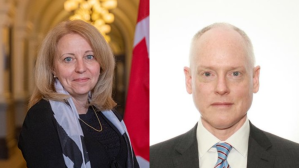‘In the Muslim world, we need democracy so that the leaders speak for what the Muslim world is thinking’
Imran Khan is one of the best all-rounders and captains cricket has ever seen, perhaps the most charismatic Pakistan has ever produced. After ending his career with the 1992 World Cup, he was briefly a cricket administrator. Now, he is more engaged in politics and charitable causes close to his heart. In an interview with The Indian Express Editor-in-Chief Shekhar Gupta on NDTV 24x7’s Walk the Talk, Khan talks about the cricketing greats of his time and today, leading a team, and politics in Islamic countries

• Hello and welcome to Walk the Talk. I am Shekhar Gupta and my guest today is someone who has to find time occasionally to talk about cricket. Imran Khan, welcome to Walk the Talk. I know you are a full-time politician, but can’t leave cricket behind.
Yes, I played 21 years of international cricket, so it will always be part of my life.
• But cricket has changed.
Yes, it has changed. It’s changed because there is a lot of one-day cricket. We never had so much one-day cricket before. And it’s had an impact. While it’s improved hitting in the game, you find runs being scored at a much faster pace than during my time. It’s improved running between the wickets. And fielding has improved. Fielding standards have gone up. Now there is more professionalism in the game. But fast bowling standards have gone down.
• If I can take you back to your playing days. From then until now, will you rank fast bowlers? You can keep yourself in one category.
Well, there were three greats, you know. There were so many fast bowlers during the time I played, but there were three I would say were outstanding. One was Michael Holding, who I thought was the most outstanding fast bowler. Then there was Dennis Lillee, who had a lion’s heart. And then, of course, there was Malcolm Marshall, who I again thought had the ability to do anything with the ball, could bowl for long spells, and who proved himself over a period as someone who could adapt to any conditions.
• He (Marshall) was not just coming with all speed.
You know when I name these three guys, all of them had exceptional qualities to their character. Michael Holding was simply the most talented. There was never a natural fast bowler like him. Then there were others, Wasim Akram on his day. Then there was Joel Garner, he was an exceptional fast bowler. Then (Richard) Hadlee in some cases. And there were others, but these three were complete fast bowlers.
• In fact that’s one thing that’s missing in world cricket. Today there are no great, great fast bowlers.
That’s right, I mean Bret Lee might reach that level, which these guys were. He’s got that pace. Shoaib Akhtar could have been there. And actually Shoaib Akhtar did win a series on dead wickets against England just last year.
• But Shoaib Akhtar’s problem is Shoaib Akhtar.
Well, as I said, you have to have everything. You have to have the character, you know, the persistence, the perseverance, the determination, the ability to bowl on dead wickets. You know that’s another ability. What’s the point of having a fast bowler who can only bowl on helpful tracks.
• How do you look at today’s proper Pakistani fast bowlers?
Well, I think the great find is Muhammad Asif. He is probably the best new-found bowler in world cricket now and Pakistan really missed him on the ICC tournament.
• I thought you said “messed him up”.
Well, the way this whole thing was done, the team was messed up. It’s conceivable that four players could have been tested positive for that dope and if four players had been tested positive, Pakistan couldn’t have played the next time. So the timing was curious, I mean, why not have the results come in before the team selection? Otherwise wait after the tournament.
• But what do you think happened with Shoaib and Asif, both enormously talented and both among the five or six best bowlers in the world now. How can a team or an administration lose them like this.
Once the results were positive, the board then had no option but to pull them out.
• How do you let pairs of that quality go out of control so much that they get caught up in that mess.
See Shekhar, I’m a great believer in natural justice. So I’m waiting for their version to come out in this inquiry. Until their version comes out in the inquiry, and the inquiry comes up with the result I’m not pronouncing them guilty, because both of them denied that they had done it. And it’s possible that they inadvertently took them because surely how could two men bowlers have taken it, specially Asif, when the ICC had stipulated that there would be dope testing in the ICC Championship. If Pakistan had reached the semi-final which it would have, had the two been playing, how could they have risked at their careers?
• But Imran, how does Pakistan have this assembly line of fast bowlers? We struggle. I know you think that this is India’s worst, poorest fast bowling attack in a very long time, even by Indian standards.
In the Championship what was on show was, I have to say, very ordinary. In fact, out of all the teams, it seemed one of the poorest attack. It’s a mystery to me. I have always wondered how come there are no fast bowlers in India, with such cricket passion running in the blood in this country. But then, in Pakistan most of the fast bowlers come from the north, either Punjab or further up. And I think if in India, you take cricket to the Punjab more, you would also have fast bowlers. But at the moment, I don’t know. Maybe it’s got something to do with culture.
• Would you advise India to acquire a bowling coach, like Pakistan has?
You see, a bowling coach does not produce fast bowlers.
• But he preserves them.
Batting is a specialist subject, fast bowling, spinning, they are all specialist areas now. I actually do see now that eventually teams will have specialist coaches for spinners, fast bowlers, fielding and batting. Every area will have a specialist.
• So a country like India which has a rich board, can invest in something like that.
It’s imperative. You have to do it. I’m perplexed that when I saw Irfan Pathan two and a half years ago, the first time in Pakistan, I thought he would become a big force in world cricket. But I’m surprised that instead of going forward, he stagnated. This could be temporary. But it would help if he has a specialist who has been through the process himself.
• Imran, just as Pakistan produces a lot of fast bowlers, we produce good batsmen. Let me ask you a question that many Indians would like to ask you. How do rank Indian batsmen from the time when you played to now? How would you rank Sunil, Sachin, Dravid?
For me, Sunil was the best Indian batsman. There were two reasons for it. Sunil was the first one, a batsman from India, who played fast bowling very well. Until then Indian batsman had this reputation that they could not play fast bowlers. And he’s the first one who stuck it out, who had the determination and the guts and technique. He developed a technique to play fast bowling. And secondly the reason why I am an admirer of Sunil is that whenever we played against India and when there was a crucial stage in the match there was one man who would worry us the most and that was him.
• And the other two I mentioned?
Rahul and Sachin both are different players. Rahul has a very strong defence, great determination and he’s Mr Dependable. Sachin, on the other hand, is flamboyant, hugely talented, one of the best timers of the ball and so a different player. So the stroke play of Sachin is to be watched, while with Rahul, when you need him, he is the most dependable batsman.
• Imran, take us back to your playing days a little bit. You had great partnerships within your own team and you had real characters in your team. You built Wasim and Waqar and you had that other great contemporary, Javed Miandad. You were very different people.
This is the thing about cricket, you know. You are in an 11 and the only thing common is cricket. You come from different backgrounds, different education levels, your characters are different, everything is different except that you are playing together. And as a captain it’s quite a challenge too to make everybody gel together.
• What was it like nursing the great fast bowlers. I’m asking you because that’s when Pakistan had its best team ever. It was a two-year period when Pakistan was the best team in the world.
They were two greats in different ways but Wasim was the most talented. Along with Michael Holding, these were the two most naturally talented fast bowlers.
• You would rank him higher than Waqar.
Higher than Waqar, because Wasim was more talented than him and had more in his repertoire and actually lasted longer than Waqar. Waqar, on the other hand, was much stronger than Wasim physically. Waqar at his peak, which was about four-five years, when he was at his best, he was lethal. Especially with the old ball, he was just unplayable. So the two of them were a great combination and they competed with each other. But they had different strengths
• And the other great talent you picked up was Inzamam.
Well, Inzamam is the most curious thing that ever happened. I mean, I only saw him for five minutes. My last year in cricket, and in five minutes I decided that he would play for Pakistan in the next year’s World Cup. And next day, when I asked the selectors, told them I want this guy, arguably the best batsman Pakistan has produced, the selectors turned around and told me, we have already seen him last couple of years and he’s a tried-and-failed prospect. He’s fat, he’s useless, his technique is wrong, and they said no you can’t pick him. By this time, I had enough credibility to force him into the team and when he came in, one of the selectors resigned. He protested that I had got the wrong man in. And so it’s possible that if I hadn’t picked him, he wouldn’t have played for Pakistan.
• What did you see in him?
What I saw in him immediately…I made Wasim and Waqar bowl to him in the nets, and what was obvious was he had more time than anybody else against that pace. While other players were struggling, he had so much time to get into position, so that’s God-gifted. If you have that sort of timing you can work. And he had a few technical flaws, mainly he would take his leg across, on which I worked with him and to a large extent got it right. But if you have that sort of gift you can work out the flaws.
• So will you rank him up among today’s batting grades like Sachin, Ponting, Rahul?
Definitely I would.
• I can’t help noticing that your much more passionate when you talk cricket still than when you talk about politics.
Politics has taken over my life, but cricket is my passion.
• Then how come we haven’t seen you play a more active role in Pakistani cricket which is so poorly managed.
Frankly, I don’t have the time now. I think that in Pakistan, cricket needs to become an institution, elected associations, electing a chairman and then the council electing a chief executive. Why should the head of the state appoint the head of the cricket board?
• Tell me something about yourself. Life’s changed for you in the last five years. What has changed? You had parties. You had a social life in London, you had a social life in Lahore. Your friends. What has changed? You have a new party circuit. Are you looking a new marriage?
People who are doing something constructive or who are struggling in life for various passions they have, they will always keep changing. People keep evolving. I have evolved too. I got bored of party circuits. I enjoy dinners with friends. Whether I’ll marry again or not, frankly, I have no idea. I have too much on my plate right now.
• Was it tough to deal with marriage?
If you get your marriage right there’s nothing like it. But you have to nurture and struggle to make your marriage a success. It just doesn’t happen by itself. But I have no desire right now to get married.
• You are not disillusioned with the idea.
Not at all. It was a better life than a bachelor’s life. Look at the commercialisation of sex today. This projection of sexuality by media to the extent that it was never done before, it puts direct pressure on the marriage. Makes people feel they are missing out.
• Did you feel it on your life as well?
Me? No, because I had spent most of my life as a bachelor, so I knew what was on the other side of the fence as well, and I appreciated marriage. Actually, I had some of the happiest times in marriage as a family man. And I love my children. Where you are as a family, and especially children, watching them grow up, nothing in life quite matches that.
• Do you miss marriage? Do you miss your years of marriage?
That’s not how I function. I never have nostalgia. I close the chapter of my past life. I always look ahead. Yes it was painful when it ended. Went through quite a painful period just before and after it ended. But then I moved on.
• You worked at saving it?
Of course, both of us did that. We put our greatest efforts in wanting to save it for the sake of our children. We did not want them to be in a single-parent family. But when you have given your best shot and once you failed then that was how it was meant to be. It was the will of God. I totally have faith in God.
• Cricket, marriage have gone out a little bit. Has spirituality taken up that space in your mind?
No, spirituality was there for the past 20 years. It’s a quest. You have to seek it.
• Has 9/11 made you more spiritual?
Nothing to do with that. My faith was sort of from my mid-30s onwards. My direction in life began to change from then onwards. 9/11 has put all the Muslims in a corner. Now Muslims have to make choices. They have to answer to a lot of questions. The problem is that who should have dealt with it were the leaders of the Muslim community. But mostly the leaders are autocrats, monarchs. Because they are under-represented, they have become tools in the hands of the US. We do not have leadership in the Muslim world. We need a very strong leadership. In the Muslim world, we need democracy so that the leaders represent the people, so that the leaders would stand up and speak for what the Muslim world is thinking.
• I believe that next year’s elections in Pakistan will see some of these topics come up. Thank you, Imran.
Thank you.
Photos





- 01
- 02
- 03
- 04
- 05


























